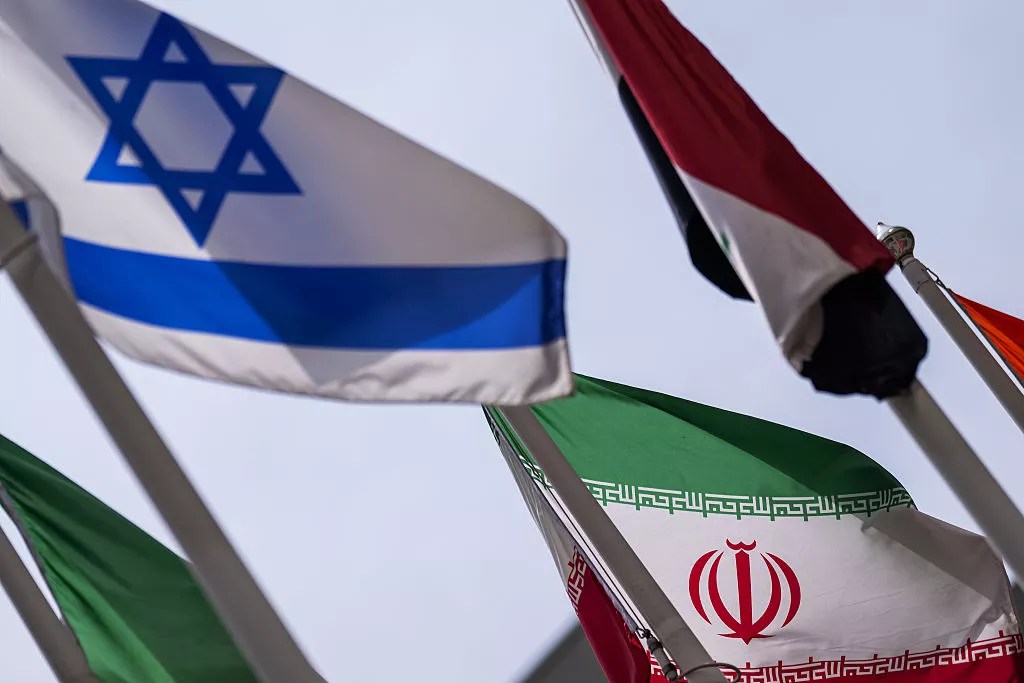
Courtesy of Liah Dolgin

Audio By Carbonatix
At sunrise, sirens blared. Students jolted awake, barefoot and disoriented, racing down stairwells into bomb shelters. Some still wore pajamas. Their long-awaited heritage trip to Israel had become a crash course in crisis response.
Liah Dolgin, an Arizona State University student from Deerfield, Illinois, was among those caught in a war zone.
“We were used to sirens every few days, but this was different,” she said. “Even the Israelis were nervous.”
Some had joined the Birthright Israel trip for a free 10-day experience. Others, like Dolgin, took part as volunteers working with people with disabilities.
Since its launch in 1999, Birthright Israel has brought nearly 900,000 Jewish teens and young adults to Israel from more than 60 countries. The program, funded by private donors – including about $500 million from the late casino magnate Sheldon Adelson – along with the Israeli government and Jewish federations, describes its goal as “strengthening Jewish identity, communities and connection with Israel.” Participants, typically ages 18 to 26, travel on guided tours through areas such as Jerusalem, Tel Aviv and the Negev Desert.
As the Iran-Israel conflict escalated in June, thousands of participants, mostly Americans, were on Birthright trips when missile strikes began.
Students scrambled to pack their bags before they even knew where they were going.
“They moved us from our apartment in Tel Aviv to a hotel in the city with safer shelters, then on to Eilat, where it felt safer,” Dolgin said. “I was scared, but I trusted our program leaders. They really took care of us.”
For parents back home, the waiting was the hardest part.
Brett Kurland, assistant dean at ASU’s Walter Cronkite School of Journalism and Mass Communication, has led multiple college study abroad trips. But when his son, 16, became one of the thousands caught in the Israel conflict, Kurland wasn’t in control. He anxiously awaited updates.
“It’s a helpless feeling when your child’s thousands of miles away in the middle of all this,” he said. “There’s not much you can physically do.”
Although his son was ultimately safe and close to a bomb shelter, the situation was stark.
“Every time there was a news report, I wasn’t just reading it – I was analyzing where each missile hit and how close it was to where my son was,” Kurland said. “You wind up processing it on a micro level instead of just thinking about the big picture.”
The summer camp program in Israel, whose organizers Kurland declined to name for security reasons, adjusted quickly once travel became impossible.
“They created programming to keep the kids engaged and made them as comfortable as they could be,” he said. “That helped a lot.”
“This didn’t go how anyone planned – but we’re grateful he was given the opportunity to go,” he said.
Birthright participants arrived in Israel seeking connection. Many would leave days later with emergency bags as war upended their plans.

As the Iran–Israel conflict escalated in June, thousands of participants, mostly Americans, were on Birthright trips when missile strikes began.
Christian Bruna/Getty Images
Project DYNAMO steps in
In early June, Project DYNAMO, a Florida-based extraction nonprofit founded by military veterans, deployed to Israel in anticipation of conflict. Days later, Israel launched a preemptive strike against Iran, followed by U.S. strikes on Iranian nuclear sites. The escalation sent Israelis and tourists alike into shelters until a ceasefire was announced on June 24.
What began as a pilgrimage to the promised land ended with more than 1,500 young Jews stranded in Cyprus, rushed out by cruise ship as sirens wailed and missiles struck cities behind them. For many families, the symbolism was hard to ignore. This was the same island where Jewish refugees once waited to enter the British Mandate of Palestine after World War II.
“When I took over the job, we anticipated something like this would happen,” said Mike Dinesman, Project DYNAMO’s operations director and a former U.S. Army Special Forces officer. “We planned this mission in August. Once we got the first few evacuation requests, we knew it was time.”
While Birthright chartered a cruise ship to evacuate its participants to Cyprus, DYNAMO coordinated smaller, less visible extractions, including four young women studying at a Tel Aviv seminary.
“Their parents were petrified,” Dinesman said. “These aren’t war-hardened people. Even the Israelis were nervous. When the highways in Tel Aviv are empty during rush hour, that tells you everything.”
For many caught in the chaos, the danger and uncertainty were disorienting. “People don’t want to make snap decisions,” Dinesman said. “I tell them, ‘I’m not here to convince you of anything, just to give you good information so you can make a good decision.'”
Project DYNAMO has evacuated more than 7,200 civilians from conflict zones in Afghanistan, Ukraine and Haiti. But Israel, Dinesman said, posed a unique logistical challenge. Sea routes that had cost about $2,000 per person the year before skyrocketed to more than $10,000 when the missiles began to fly between Israel and Iran.
“Even if I had unlimited funds, that’s not a smart use of donor money,” he said. “We had to pivot fast.”
As rescue teams worked, a deeper question emerged: Why had so many young American Jews signed up for Birthright this summer despite the threat of war?
“Birthright is trying to instill an inherent connection to the land of Israel for diaspora Jews,” said Ezra Alpert, a recent ASU graduate and former Birthright participant.
He described the rise in participation as both emotional and intentional.
“The Jewish connection to the land of Israel has been relatively threatened through heightened antisemitic activity over the last couple of years,” Alpert said. “Americans and diaspora Jews feel more threatened than they have in decades – not just in their identity as Jews, but in their connection to Israel.”
Birthright provides an antidote.
“I think young Western Jews are yearning for some sort of connection to something that’s rooted in us all,” Alpert said. “People want to belong.”
Israel’s military operations in Gaza after Hamas attacked on Oct. 7, 2023, have left American Jews deeply divided.
“Jewish organizations are promoting very pro-Israel and pro-Zionist forums,” Alpert said. “But less religiously inclined Jews are seeing more anti-Israel messaging. It’s confusing. It feels like a zero-sum fight with no room for coexistence.”

What began as a pilgrimage to Israel ended with more than 1,500 students stranded in Cyprus. Many were rushed out on cruise ships.
Courtesy of Liah Dolgin
Holding on to identity
Dolgin echoed that uncertainty but said the experience only strengthened her identity.
“Being in Israel during this time reminded me how important it is to stay proud of my Judaism when it’s being threatened,” she said. “There’s strength in staying connected.”
Alpert’s father, Rabbi Avi Alpert, echoed the concern – but also the importance of commitment.
“For a young Jew to show up real today, especially in a place as charged as Israel, means finding a connection that’s not defined by politics,” he said. “That starts in the community, around the Shabbat table, not on Twitter.”
The rabbi, who leads a congregation in Arizona, said he encourages students to find meaning in people, not policy.
“I tell them: Israeli government actions don’t define Judaism. Just like our own government doesn’t always represent us,” he said. “But I also remind them, don’t let global narratives erase what this place means to our people.”
Still, he acknowledged feeling uneasy about the current climate.
“As a parent, it’s terrifying,” he said. “I want my kids to feel safe, but I also think their desire to go, to witness it for themselves, is incredibly powerful. You can’t outsource experience.”
Not all Birthright participants witnessed missile strikes.
Some were relocated to hotels in Tel Aviv, Jerusalem and other smaller cities . Others waited out delays in lobbies. One trip leader called it “just a different chapter of the trip,” according to the Times of Israel.
Dinesman emphasized that Project DYNAMO avoids political alignment in its missions.
“We’re not here to talk about the strikes or who’s to blame,” he said. “We’re here to get people out. And we’ll come for anyone – not just Americans. If you need help, that’s all that matters.”
He reflected on his own connection to the region.
“My daughter’s coming to study” in Israel soon, he said. “We just learned we have 30 relatives who survived the Holocaust and rebuilt their lives in Israel. That connection outweighs the fear.”